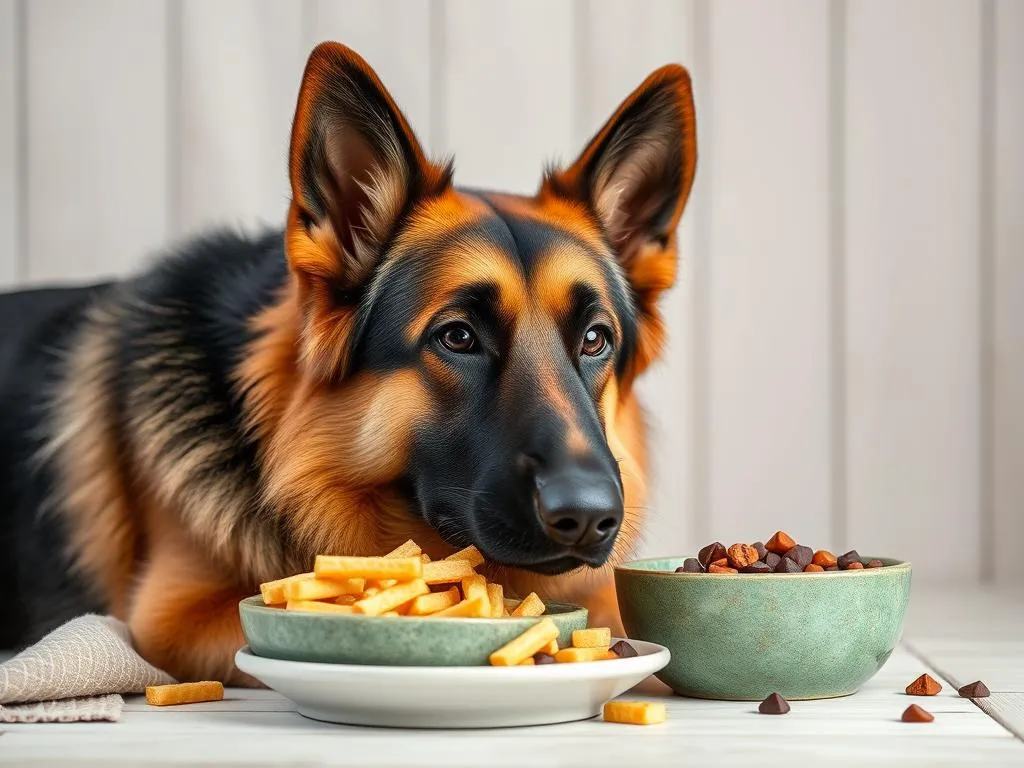
Introduction
German Shepherds are known for their intelligence, strength, and versatility. As a breed, they are often employed in various roles, from police and military work to being loyal family companions. However, their active lifestyle requires a diet that meets their specific nutritional needs. Proper nutrition is crucial not only for their overall health but also for maintaining a healthy weight.
Weight gain can be particularly important for German Shepherds that are underweight due to various reasons, such as recovering from an illness, being picky eaters, or simply not consuming enough calories to match their activity levels. Being underweight can lead to several health issues, including weakened immune systems and increased susceptibility to diseases. Therefore, understanding the best foods for German Shepherds to gain weight is essential for their well-being.
Understanding German Shepherds’ Nutritional Requirements
Key Nutritional Components
Proteins play a vital role in muscle development, which is especially important for active breeds like German Shepherds. High-quality protein sources like chicken, beef, lamb, and fish provide essential amino acids needed for growth and repair.
Fats are another critical component of a German Shepherd’s diet, particularly healthy fats that aid in weight gain and energy provision. Sources such as fish oil, flaxseed oil, and chicken fat can help increase calorie intake while promoting a shiny coat and healthy skin.
Carbohydrates provide energy and should not be overlooked. Healthy carbohydrate sources, such as sweet potatoes, brown rice, and oats, can help maintain energy levels for your active dog.
Vitamins and Minerals
Essential vitamins and minerals are necessary for overall health and immune support. Vitamins like A, D, E, and B-complex, along with minerals such as calcium, phosphorus, and zinc, all play important roles in various bodily functions. A well-rounded diet that includes these nutrients helps ensure your German Shepherd thrives.
Identifying the Best Foods for Weight Gain
Commercial Dog Foods
When looking for the best foods for German Shepherds to gain weight, consider high-calorie kibble options. Brands like Blue Buffalo, Orijen, and Wellness CORE offer formulas specifically designed for weight gain, providing a higher fat and protein content that supports muscle growth and overall health.
Wet or canned foods can also be beneficial for weight gain. They tend to be more palatable and calorie-dense, making it easier for your dog to consume more calories. Brands such as Merrick and Hill’s Science Diet offer wet food options that are both nutritious and high in calories.
Homemade Dog Food Recipes
If you prefer cooking for your dog, you can create nutritionally balanced recipes that include high-calorie ingredients. For example:
-
Chicken and Sweet Potato Stew: Cook chicken thighs and mix with boiled sweet potatoes, peas, and carrots. This dish is rich in protein and carbohydrates.
-
Beef and Rice Mix: Brown ground beef and mix with cooked brown rice, green beans, and a small amount of olive oil for healthy fats.
When preparing homemade meals, be sure to consult with a veterinarian or a pet nutritionist to ensure you’re meeting all of your dog’s nutritional needs.
Supplementing with Treats and Snacks
In addition to regular meals, you can incorporate high-calorie treats to aid in weight gain. Look for treats that are rich in protein and fats, such as peanut butter biscuits or salmon-flavored chews.
You can also make simple homemade snacks, such as:
-
Banana and Peanut Butter Bites: Mix mashed bananas with peanut butter and freeze them for a tasty treat.
-
Pumpkin and Oatmeal Cookies: Combine canned pumpkin with oatmeal and bake for healthy, calorie-dense cookies.
Feeding Strategies for Weight Gain
Meal Frequency and Portion Sizes
Feeding your German Shepherd multiple smaller meals throughout the day can help with weight gain. Instead of two large meals, consider breaking it down into three to four smaller meals. This approach can also help prevent digestive issues and make it easier for your dog to consume more calories.
Adjusting portion sizes is also crucial. Monitor your dog’s activity level and adjust food portions accordingly. If your dog is more active, it may require more calories to sustain energy levels.
Monitoring Weight and Health
Regular weigh-ins are essential to track your dog’s progress. Keep an eye on their weight over time and look for signs of healthy weight gain, such as increased energy levels, a shiny coat, and an overall happy demeanor. If you notice any drastic changes in weight or health, consult your veterinarian.
Common Challenges and Solutions
Picky Eaters
If your German Shepherd is a picky eater, it can be challenging to get them to consume enough calories. Try mixing different types of food or adding flavor enhancers like low-sodium broth to entice them. Rotating between wet and dry food can also keep mealtime interesting.
Health Concerns Affecting Weight
Several health issues can affect a dog’s ability to gain weight, including thyroid problems, metabolic disorders, or gastrointestinal issues. If you suspect that your dog is struggling to gain weight despite a proper diet, it’s essential to consult a veterinarian for a thorough examination and appropriate treatment.
Conclusion
Proper nutrition is vital for the health and well-being of German Shepherds, especially when it comes to managing their weight. Selecting the best foods for German Shepherds to gain weight involves understanding their unique nutritional needs and providing them with a balanced diet that includes high-quality proteins, healthy fats, and carbohydrates.
By tailoring feeding strategies to meet your dog’s individual needs, you can help them achieve a healthy weight while ensuring long-term health and wellness through proper diet. Always listen to your veterinarian’s advice when making dietary changes, and remember that a healthy German Shepherd is a happy German Shepherd.









